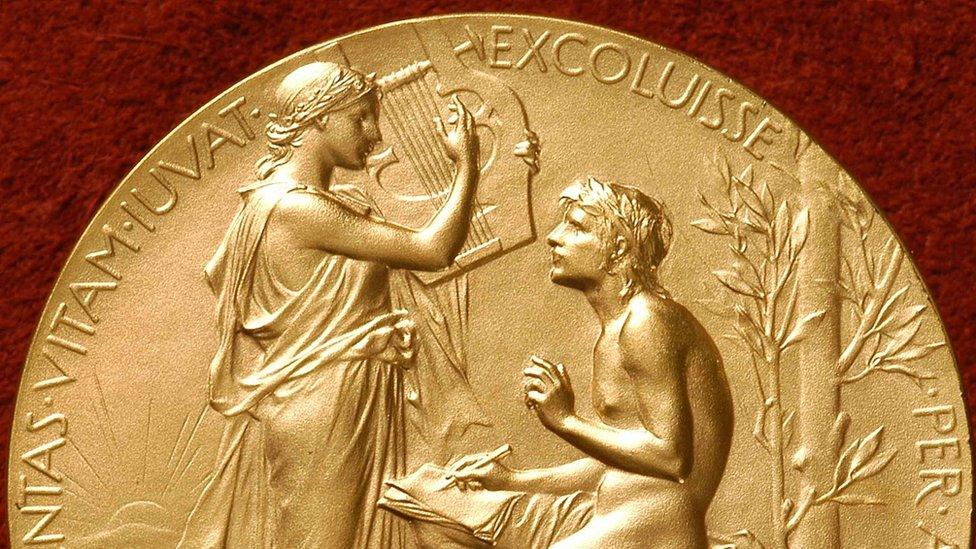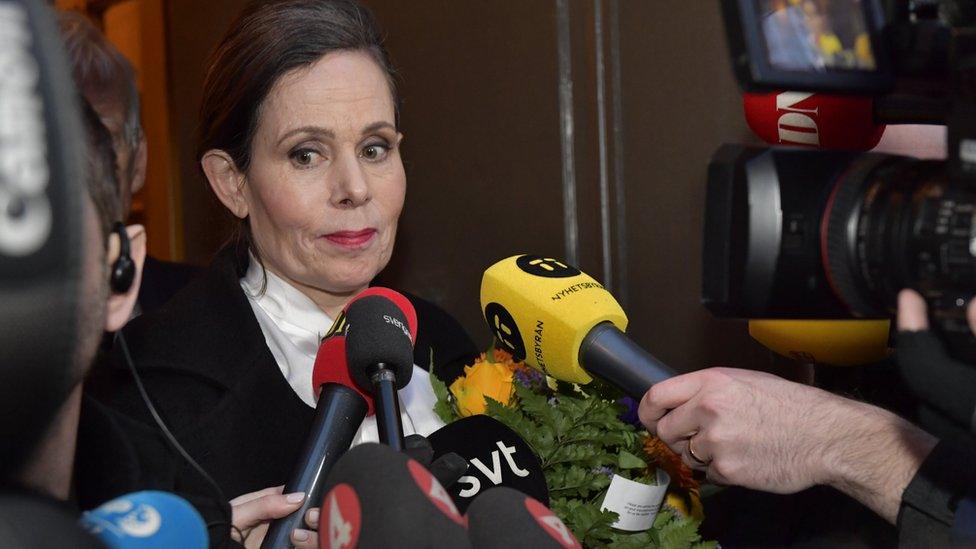Nobel Prize for Literature delayed amid Swedish Academy 'sex assault' scandal
- Published

The academy will now announce the 2018 winner along with the 2019 winner next year
The organisation that decides the Nobel Prize for Literature has said it will not announce an award this year, after it was engulfed in a scandal over sexual assault allegations.
The Swedish Academy has been in crisis over its handling of allegations against the husband of a member.
She has since quit, as have the academy's head and four other members.
The academy says it will now announce the 2018 winner along with the 2019 winner next year.
The scandal is the biggest to hit the prize since it was first awarded in 1901.
Apart from six years during the world wars, there has been only one year when the prize was not awarded. No worthy winner was found in 1935.
This year's other Nobel prizes will go ahead as usual.
What did the academy say?
In a statement on its website, the academy said, external: "The present decision was arrived at in view of the currently diminished Academy and the reduced public confidence in the Academy."
It said that the academy's "operative practices need to be evolved", including tackling its statutes, conflict-of-interest issues and management of information.

Anders Olsson, the academy's interim permanent secretary, said there needed to be "long-term and robust work" for change
Some academy members had argued that the prize should proceed to protect the tradition, but others said the institution was in no state to present the award.
The #MeToo campaign, which showed the prevalence of sexual assault globally, may have played a part in the academy's decision. It would have been difficult for potential winners to accept the prize with the academy in such turmoil.

Academy faces struggle to regain reputation
Analysis by Maddy Savage, BBC News, Stockholm
This is an unusual but not entirely unexpected decision here in Sweden where internal spats between members and former members of the Swedish Academy have been headline news for months.
The institution has faced deep criticism from the academic community with hundreds of professors, lecturers and researchers signing a number of letters calling for the academy to take action to restore its credibility.
But this is a scandal that's also captured wider attention. Many Swedes are fiercely proud of the Nobel prizes and the fact that they live in a country that usually champions women's rights.
Seeing the prestigious literature award committee unravel off the back of the mishandling of sexual assault allegations has been a bitter pill to swallow. Not everyone is confident the academy will regain its reputation in time for next year's prize announcements.

What sparked the crisis?
Divisions started to emerge last November when French photographer Jean-Claude Arnault, who ran a cultural project with funding from the Swedish Academy, was accused by 18 women of sexual assault.
Several of the alleged incidents reportedly happened in properties belonging to the academy. Mr Arnault denies the allegations.
The organisation later voted against removing Mr Arnault's wife, the poet and writer Katarina Frostenson, from its committee.

The academy's permanent secretary, Prof Sara Danius, resigned
This, along with accusations of conflict of interest and the leaking of Nobel winners' names, divided the organisation.
What followed was a wave of resignations, including Ms Frostenson and the head of the academy, Prof Sara Danius.
Only 11 members are now in place. Of those, one, Kerstin Ekman, has been inactive since 1989, when the academy refused to condemn the fatwa issued over Salman Rushdie's The Satanic Verses.
The academy's statutes require a quorum of 12 to vote in any new members.
Technically, members are appointed for life to the Swedish Academy and cannot resign, although they can refuse to take part. Academy patron King Carl XVI Gustaf has said he will change the rules to allow them to quit formally.
So what happens next?
The academy said: "Work on the selection of a laureate is at an advanced stage and will continue as usual in the months ahead but the Academy needs time to regain its full complement, engage a larger number of active members and regain confidence in its work, before the next Literature Prize winner is declared."
Two prizes for literature will be announced next year, one for 2018 and one for 2019.
This is not the first time this has happened. On five occasions a prize for one year has been awarded at the same time as the following year's prize. For example, American playwright Eugene O'Neill was given the 1936 award in 1937.
What's the social reaction been?
A number have highlighted the importance of #MeToo, among other theories and opinions, including the neglect of Kenyan writer Ngugi wa Thiong'o...
Allow X content?
This article contains content provided by X. We ask for your permission before anything is loaded, as they may be using cookies and other technologies. You may want to read X’s cookie policy, external and privacy policy, external before accepting. To view this content choose ‘accept and continue’.

Allow X content?
This article contains content provided by X. We ask for your permission before anything is loaded, as they may be using cookies and other technologies. You may want to read X’s cookie policy, external and privacy policy, external before accepting. To view this content choose ‘accept and continue’.

Allow X content?
This article contains content provided by X. We ask for your permission before anything is loaded, as they may be using cookies and other technologies. You may want to read X’s cookie policy, external and privacy policy, external before accepting. To view this content choose ‘accept and continue’.
Allow X content?
This article contains content provided by X. We ask for your permission before anything is loaded, as they may be using cookies and other technologies. You may want to read X’s cookie policy, external and privacy policy, external before accepting. To view this content choose ‘accept and continue’.
Allow X content?
This article contains content provided by X. We ask for your permission before anything is loaded, as they may be using cookies and other technologies. You may want to read X’s cookie policy, external and privacy policy, external before accepting. To view this content choose ‘accept and continue’.
The Nobel prizes

Swedish scientist Alfred Nobel set up the prizes in his will in 1895
The five were Chemistry, Literature, Peace, Physics and Physiology (Medicine)
The Nobel Prize for Economics was set up in 1968 in memory of Alfred Nobel
The awards are decided by different bodies. The Royal Swedish Academy of Sciences oversees Physics, Chemistry and Economics. The Nobel Assembly awards Medicine and the Swedish Academy covers Literature. Peace is the only award not decided by a Swedish organisation - the Norwegian Nobel Committee decides it
Literature has been awarded annually since 1901, save for six years during the two world wars and 1935. The winner receives a gold medal, a diploma and a cash sum based on the Nobel Foundation's income for the year. The laureate is invited to give a lecture and there is a banquet and award ceremony on 10 December
Nobel winners that seemed a good idea at the time
- Published4 May 2018

- Published29 April 2018

- Published12 April 2018

- Published1 December 2017